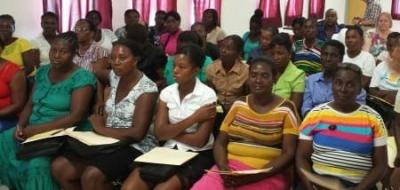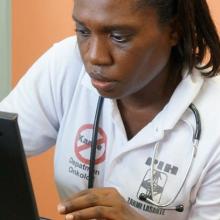While it’s important for victims of gender-based violence (GBV) to receive compassionate medical care, medical care alone isn’t nearly good enough.
According to Dr. Eddy Jonas, head of women’s health for PIH’s Haitian sister organization Zanmi Lasante, a proper treatment and prevention program for victims of sexual or physical assault must foster linkages between health institutions, police, judges, and public authorities. It requires training a wide range of health professionals to recognize not only medical needs, but psychosocial ones. There must also be proper systems in place for tracking and documenting GBV cases, as well as community education and outreach campaigns.
Until now, Zanmi Lasante has never had the resources to undertake such comprehensive work in Haiti, but a new project funded by PIH Canada is laying the groundwork for such a transformation. “The appropriate way to address the GBV issue,” said Dr. Jonas, “is a multidisciplinary approach which puts together, in a network, the law enforcement system, a strengthened health system, and psychosocial and community supports.”
Since early January, Dr. Jonas and colleagues from across the ZL women’s health and psychosocial teams – obstetricians and gynecologists, psychologists, nurses, social workers and community health workers – have been putting the program in place. Twenty-two GBV education sessions have been taught at a community level, reaching a more than 650 people. Six social workers assistants, focused exclusively on GBV treatment, support, and documentation, have been hired to work at six ZL sites involved in the project: Hinche, Belladere, Mirebalais, Petite-Riviere, Verrettes and St-Marc. A facilities assessment in January revealed gaps in GBV protocols being implemented, including standard documentation of cases and psychosocial care and community accompaniment.

GBV Community Health Worker training in Haiti
Since then, there has been a review of all GBV procedures, and systems are being established to better track GBV cases each month and provide comprehensive follow-up. From early February through late March, nearly 200 facility-based and community-based staff across the ZL network attended GBV training sessions, including doctors, nurses, social workers and 131 female community health workers specifically focused on women’s health. Pre- and post-training test scores showed dramatic improvements in GBV-related knowledge and understanding.
“The psychosocial consequences of gender based-violence (GBV) are devastating and lasting, and then the usual medical care (alone) can’t bring necessary relief to the victims,” Dr. Jonas said. “That’s why these trainings are so important.”
The project is just getting started and much more work needs to be done in the coming months and years. Our thanks go out to PIH Canada donors for making this effort possible.
